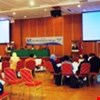

 Myanmar Water Partnership together with Irrigation Department (ID), Ministry of Agriculture and Irrigation (MOAI) of the Government of Union of Myanmar, with sponsorship support from Global Water Partnership - South East Asia (GWP-SEA) held a dialogue on Water-Food-Energy Security as a Major Contributing Constituent for Sustainable National Development in Myanmar.
Myanmar Water Partnership together with Irrigation Department (ID), Ministry of Agriculture and Irrigation (MOAI) of the Government of Union of Myanmar, with sponsorship support from Global Water Partnership - South East Asia (GWP-SEA) held a dialogue on Water-Food-Energy Security as a Major Contributing Constituent for Sustainable National Development in Myanmar.

GWP Indonesia workshop on urban water management challenges which was held on 28 November 2012 brought together experts on water management, government officers, NGOs and academia to deliberate on the challenges of water management in urban area with focus on issues related to waste water and drainage in Jakarta, Capital city of Indonesia.

As a co-organizer of the East Africa Young Water Professionals Conference held in Rwanda’s capital Kigali, December, 2012, GWP Eastern Africa contributed to the adoption of Water Declaration directed to government decision-makers in East Africa and beyond.

As a co-organizer of the East Africa Young Water Professionals Conference held in Rwanda’s capital Kigali, December, 2012, GWP Eastern Africa contributed to the adoption of Water Declaration directed to government decision-makers in East Africa and beyond.

GWP Mediterranean will launch the Water, Climate and Development Programme (WACDEP) for Northern Africa on 20 December 2012 in Tunis, Tunisia.

GWP Lithuania and Poland take part in a consortium led by Stockholm International Water Institute to support sustainable water resources management of international rivers shared by countries in the Eastern part of the Baltic Sea.

The United Nations Development Programme/Global Environment Facility project, completed at the end of 2012, mainstreamed integrated ecosystem management principles and practices in land and water management.

In a series of consultative workshops held between August and December 2012, Rwanda and Burundi water and climate stakeholders pledged to support the successful implementation of the Water, Climate and Development Programme (WACDEP) in the Lake Cyohoha transboundary water catchment.

GWP Eastern Africa used a recent conference to showcase GWP's philosophy, its current drive to mobilise collective efforts towards climate change adaptation and the role youth can play in lessening the effects of climate change in Eastern Africa.

GWP Eastern Africa used a recent conference to showcase GWP's philosophy, its current drive to mobilise collective efforts towards climate change adaptation and the role youth can play in lessening the effects of climate change in Eastern Africa.